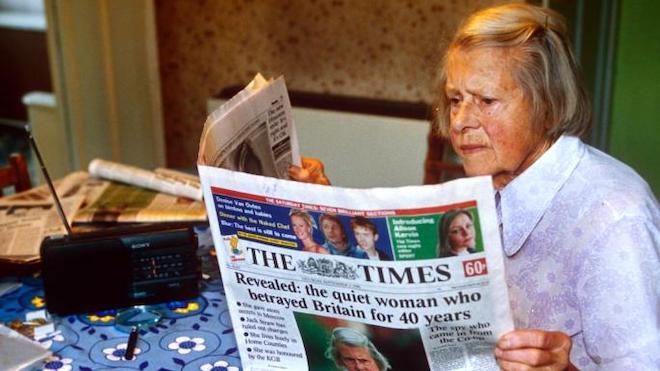Reds in the bed
 Critics' Corner,
Critics' Corner,  Miss Lumière •
Miss Lumière •  Monday, July 8, 2019
Monday, July 8, 2019 Unreal events rendered lifeless in Red Joan ... The chutney-making housewife who passed on atomic research secrets to the Soviet Union ... A nice job at the Non-Ferrous Metals Research Association ... The true story of the spy Melita Norwood is yet to come ... Miss Lumière is deeply unmoved with this version
 Melita Norwood, the real Red Joan ... outed by The Times in 1999
Melita Norwood, the real Red Joan ... outed by The Times in 1999
Red Joan should come with a Red Alert: prepared to be bored by one of the most remarkable espionage stories of the twentieth century.
Although the film is "inspired" by the true story of a notoriously successful WW11 Soviet spy who passed on notable British atomic research secrets, it lacks all the thrill, drama, sex and intrigue such a tale demands.
Red Joan is as listless as Stalin's corpse and as stodgy as yesterday's borscht.
The writer (Lindsay Shapero) and the director (Trevor Nunn, who should know better) deserve to be shot at dawn, in no particular order.
Together they've managed to turn an extraordinary story of subterfuge into sentimental tedium, in the process wasting the prodigious talents of Dame Judi Dench and voluptuous young newcomer Sophie Cookson.
Historical accuracy in sets and costumes do not a drama make, no matter how many tweeds and hastily stubbed out cigarettes in dark corners bespeak authenticity.
The problem is largely contained in the word "inspired" which prefaces the film, as in "this film was inspired by real events".
It should have read: "This film has ignored real events in favour of puerile fantasy."
Chief culprit is an entirely unconvincing romantic interest - the St Sebastian-like Tom Hughes as Leo, a German Jewish Bolshevik who seduces young Joan Stanley (physically and politically) with his idealistic ardour and luscious lips.
It didn't ring true, because it wasn't, although Leo is loosely based on René Kuczynski, who fled Germany when the Nazis took power in 1933, and/or Andrew Rothstein, son of one of Lenin's closest advisors.
The figure of Sonya, Leo's "cousin", the glamourpuss Soviet operative who recruits several Cambridge students - among them a young gay blade (Sir William Mitchell, played by Freddie Gaminara) who winds up at the top of the Foreign Office tree - is a cardboard version of the real Sonya, Kuczynski's daughter Ursula.
In the film, Sir William's death precipitates the unravelling of Red Joan's nefarious activities while she worked as a research assistant at Tube Alloys – then a cover for British scientists working on the development of the atomic bomb.
The "Tube Alloys" project - research in fact conducted by the British Non-Ferrous Metals Research Association - is just about the only accurate historical detail your reviewer could unearth in this dull stew of invention.
Red Joan was actually Melita Norwood, a die-hard young commie from a Southampton family of commies (and Soviet spies) who worked as a secretary at N-FMRA, not a scientist.
Crucially, no dead Foreign Office toff's papers revealed her wartime role as a spy. In fact, it was KGB archivist and defector Vasili Mitrokhin, whose files unmasked Norwood to intelligence authorities in 1992.
The British government decided she was too old at 80 to prosecute and her identity wasn't publicly revealed until 1999, by The Times.
All intriguing stuff, but not intriguing enough, it seems, for Red Joan's filmmakers.
And poetic, filmic licence doesn't cut it in this case, simply because the drama is so flaccid, the characters so flimsy and the emotion so fruity.
To be fair, there are a couple of scenes which pack dramatic power, notably when Red Joan faces the media in her bog-ordinary suburban front garden to explain why she did what she did:
"I'm not a traitor. I wanted the Russians to be on an equal footing to us. I loved my country. I was fighting for the living. They haven't used it [the atomic bomb] for fifty years. You see, I was right, wasn't I?"
Notwithstanding Dench's canny, sympathetic portrayal, Miss Lumière respectively suggests you wait for the upcoming BBC drama series, The Spy Who Came in from the Co-Op, based on David Burke's book of the same name.
It promises to be truly inspired.
 Film review
Film review 









Reader Comments